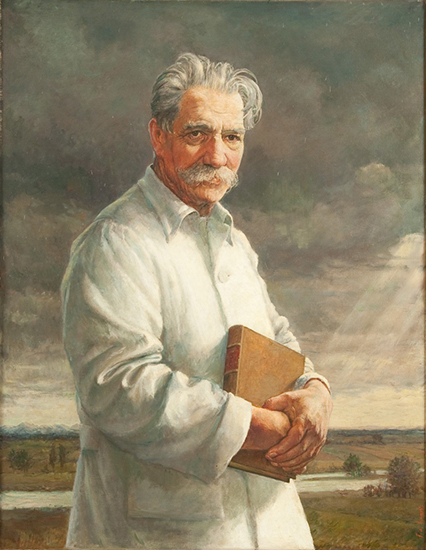The first floor gallery of the Royal College of Physicians building is home to a diverse collection of portraits. Most of the portraits show fellows of the RCP, but one – a portrait of Albert Schweitzer (1875–1965) –tells a captivating story of the marriage of theology and medicine through the life of the man himself.
Albert Schweitzer: a life of two halves
Theological Beginnings
Schweitzer contributed significantly to the field of medicine and theology during his life-time. Schweitzer was born into an Alsatian family with an intensely theological background- his father and maternal grandfather were both minsters. He began his theological studies in 1893 and obtained a doctorate in Philosophy from the University of Strasbourg in 1899, but was also an esteemed organist and musician.
Medical Ends
However, his later life is dominated by his study of medicine. Schweitzer began to study medicine at the University of Strasbourg in 1905. After Schweitzer had obtained his MD degree, he founded the Albert Schweitzer Hospital in French Equatorial Africa in 1913. After a brief period of imprisonment as a prisoner of war in a French internment camp between the years 1917–1918, Schweitzer resided in Europe for six more years before he returned once again to his Hospital in Lambaréné where he lived out the rest of his days. During his time in Lambaréné, he was doctor and surgeon in the hospital, pastor, superintendent of buildings and grounds, playing a very active role in the local community.
Schweitzer’s legacy?
His achievements include the establishment of the Albert Schweitzer Hospital in 1913 in French Equatorial Africa, now Gabon, which he continued to run until his death in 1965. The hospital celebrated its 100 birthday in 2013. Schweitzer received the Nobel Peace Prize in 1952 and also wrote extensively on the subject of theology. However, as Cornel du Toit, Head of the Research Institute for Theology and Religion at the University of South Africa writes, “to revisit the life and work of … Albert Schweitzer is not possible without being influences by … the history of Germany’s colonization of Namibia, [and] the history of post-colonialism”. As Cornel du Toit continues, in “an imperialist context, ideas are forced upon inhabitants”, and medical practice is no exception to this and “colonialism must be considered much broader than the invasion of a specific geographical area”. Schweitzer’s decision to train as a physician was in answer to an article in the Paris Mission Society magazine which outlined the needs of the Congo mission, demonstrating one of Schweitzer’s many links to colonialism.
Schweitzer, Colonialism and Africa:
Atypically, Schweitzer did not take up local languages nor did he, according to Cornel du Toit, attempt to understand locals. While many would argue that “Schweitzer may not have had bad intentions, his attitudes did not sit well with Africans” and he referred to himself as an elder brother according to Sithole whilst “refusing to teach medicine to his assistants and treat[ing] his patients like children”. Schweitzer’s relationship with colonialism and imperialism is a complex one as he routinely wrote against both in his 1953 autobiography.
Opinion remains divided amongst scholars on the nature of the man behind the paternalistic myth. One thing remains true and that is that Schweitzer is a complex and at times contradictory figure who cannot be extricated from the colonial context in which he operated even if this was with the “best intentions”.
George Redford, summer micro-intern, University of Oxford
Further reading on the subject of Albert Schweitzer and colonialism:
- Schweitzer, A, Out of my life and thought: An autobiography ed Henry Holt (New York, 1953)
- Spangenberg and Landman. The Legacies of Albert Schweitzer Reconsidered 2016
- Sithole in in Spangenberg and Landman, The Legacies of Albert Schweitzer Reconsidered (Durbanville, South Africa: AOSIS, 2016)

